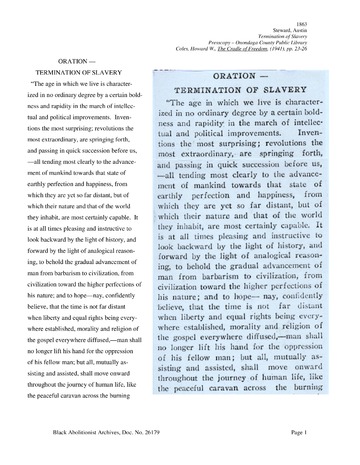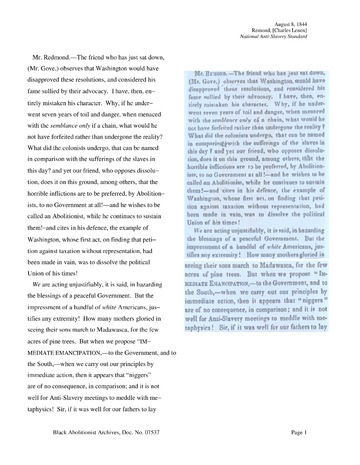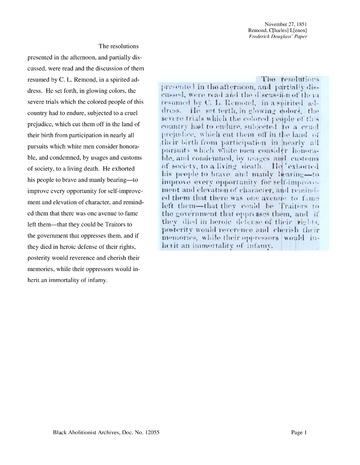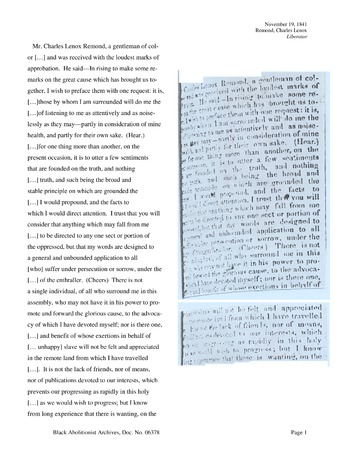(page1).jpg.jpg)
Title: Anglo-African - October 7, 1865
Speaker or author: editor
Newspaper or publication: Anglo-African (1863 - 1865)
The writer expresses the fears that permeate African American communities that the white slaveholders will demand a return to the system of slavery, and be granted this by the government. The majority of African Americans, however, are determined to resist and not allow this to happen without a fight.
Description of file(s): two scanned newspaper pages (three columns) (blank sections throughout)

Speaker or author: Steward, Austin
Newspaper or publication: Presscopy -- Onondaga County Public Library [Coles, Howard W., The Cradle of Freedom, (1941), pp. 23-26]
At the termination of slavery in the U.S., the speaker reflected on what had been an accepted economic mainstay in the system of slavery and what potential for change was now available for all U.S. citizens. He urged his audience to take advantage of the opportunity to prosper by adopting a Christian lifestyle, avoiding "hard spirits," and focusing on civil rights.
Description of file(s): PDF 10 page, 2,307 word document (text and images)

Speaker or author: Remond, Charles Lenox, 1810-1873
Newspaper or publication: National Anti-Slavery Standard
Speech regarding the injustice of a government that would make laws to benefit one race over another, yet expect all races to pay taxes and die for their country.
Description of file(s): PDF 4 page, 1,104 word document (text and images)

Speaker or author: Remond, Charles Lenox, 1810-1873
Newspaper or publication: Frederick Douglass' Paper
Brief overview of a speech expressing an appreciation for the endurance of African Americans who were dealing with the cruelties of slavery and prejudice. The speaker encouraged them to defend their rights even if it meant being "traitors" to the government.
Description of file(s): PDF 1 page, 156 word document (text and image)
spe.pdf.jpg)
Speaker or author: Remond, Charles Lenox, 1810-1873
Newspaper or publication: Printed Copy -- Rhode Island Historical Society -- Newspaper Clipping File
The speaker came forward after the audience's call for Father Henson went unanswered. He said he hoped a defiant attitude toward ending the oppression of slavery would be the end result at the end of this convention.
Description of file(s): PDF 1 page, 251 word document (text and image)

Speaker or author: Remond, Charles Lenox, 1810-1873
Newspaper or publication: Liberator
Speech given before a meeting of the Hibernian Anti-Slavery Society regarding the continued injustices and horrors of American slavery, and how this is perceived by people in other countries.
Description of file(s): PDF 19 page, 5,634 word document (text and images)
(page1).jpg.jpg)
Title: Colored American - April 17, 1841
Speaker or author: editor
Newspaper or publication: Colored American (1837 - 1842)
The writer comments on the irony in the actions of those who band together as Republicans in Tammany Hall. They promise justice, equality, and fairness, yet deliver only corruption and prejudice.
Description of file(s): one scanned, two columned, newspaper page
(page1).jpg.jpg)
Title: Colored American - August 11, 1838
Speaker or author: editor
Newspaper or publication: Colored American (1837 - 1842)
The writer expresses his belief that the abolitionists are doing God's work and those who oppose them, oppose God.
Description of file(s): one scanned, one columned, newspaper page
(page1).jpg.jpg)
Title: Colored American - August 12, 1837
Speaker or author: editor
Newspaper or publication: Colored American (1837 - 1842)
In an effort to help, the friends of free African Americans are pushing them through an inadequate education and sending them into a prejudiced society unprepared for the challenges that await them there. By assuming that African Americans are not capable of more than this, those who are acting on their behalf, are doing more harm than good, even though their intentions are well meaning.
Description of file(s): one scanned, two columned, newspaper page
(page1).jpg.jpg)
Title: Colored American - August 19, 1837
Speaker or author: editor
Newspaper or publication: Colored American (1837 - 1842)
In order to protest the requirement that African Americans occupy a segregated section of the Broadway Tabernacle, the writer asks them to boycott this church until changes ae made. He also suggests that groups of 25 African Americans spread out over several white churches if they feel they must attend instead of all going to one particular church.
Description of file(s): one scanned, one columned, newspaper page
(page1).jpg.jpg)
Title: Colored American - December 16, 1837
Speaker or author: editor
Newspaper or publication: Colored American (1837 - 1842)
The writer reminds his readers of the importance of suffrage for all Americans. He expresses his view that "without the right of suffrage, we are, and must remain, a nonentity in the State and National governments...." He urges his readers to petition the government for the rught of suffrage for free African Americans.
Description of file(s): one scanned, one columned, newspaper page
(page1).jpg.jpg)
Title: Colored American - February 3, 1838
Speaker or author: editor
Newspaper or publication: Colored American (1837 - 1842)
The writer expresses his views that by its silence on the subjects of slavery and prejudice, the Church implies an acceptance of the system. By not addressing an issue that is in direct opposition to the teachings of Christ, church going people are not persuaded to fight against slavery.
Description of file(s): one scanned, two columned, newspaper page
(page1).jpg.jpg)
Title: Colored American - January 20, 1838
Speaker or author: editor
Newspaper or publication: Colored American (1837 - 1842)
The writer encourages his readers to take advantage of lectures and other opportunities to improve their minds and the condition of their lives. Work in this direction benefits not only those who pursue it but generations of African Americans to follow.
Description of file(s): one scanned, one columned, newspaper page
(page1).jpg.jpg)
Title: Colored American - January 27, 1838
Speaker or author: editor
Newspaper or publication: Colored American (1837 - 1842)
The writer reports on a petition submitted to local authorities by the African American people of Buffalo, New York, listing their grievances regarding the way they are being treated.
Description of file(s): one scanned, one columned, newspaper page
(page1).jpg.jpg)
Title: Colored American - July 22, 1837
Speaker or author: editor
Newspaper or publication: Colored American (1837 - 1842)
The writer calls for the repeal of laws restricting African Americans. He emphasizes that people from other countries can settle in the U.S. and be awarded full citizenship rights that are still denied to African Americans. This situation must change, and he calls upon his readers to take action now to help make this change possible.
Description of file(s): one scanned, two columned, newspaper page
(page1).jpg.jpg)
Title: Colored American - June 24, 1837
Speaker or author: editor
Newspaper or publication: Colored American (1837 - 1842)
The writer suggests that the free people of color can help the slaves by concentrating on improving their own lives through education, industry, and economy. He believes that fighting prejudice involves presenting an intelligent, hard-working social presence.
Description of file(s): one scanned, one columned, newspaper page
(page1).jpg.jpg)
Title: Colored American - June 30, 1838
Speaker or author: editor
Newspaper or publication: Colored American (1837 - 1842)
The writer expresses his alarm at the increase in racial prejudice that is taking place in public transportation.
Description of file(s): one scanned, one columned, newspaper page
(page1).jpg.jpg)
Title: Colored American - June 8, 1839
Speaker or author: editor
Newspaper or publication: Colored American (1837 - 1842)
The writer describes the actions of a pro-slavery faction operating in the newly emancipated British West Indies. These men are attempting to continue the oppression of newly freed slaves by making their lives unbearable.
Description of file(s): one scanned, two columned, newspaper page
(page1).jpg.jpg)
Title: Colored American - March 15, 1838
Speaker or author: editor
Newspaper or publication: Colored American (1837 - 1842)
The writer notes that the prejudice against skin color known in the U.S. has originated here and is uniquely our own. This sort of prejudice cannot be found in other countries. Not only does it originate here, but it is encouraged and condoned here by those in powerful positions, including Church officials and preachers.
Description of file(s): one scanned, one columned, newspaper page
(page1).jpg.jpg)
Title: Colored American - March 29, 1838
Speaker or author: editor
Newspaper or publication: Colored American (1837 - 1842)
The writer informs his readers that an appeal has been presented before the Supreme Court denouncing and protesting the actions of the "Reform Convention." He said if this "Reform Convention" has done anything good at all it has exposed the Colonization Society for the sham it really is.
Description of file(s): one scanned, one columned, newspaper page
(page1).jpg.jpg)
Title: Colored American - May 11, 1839
Speaker or author: editor
Newspaper or publication: Colored American (1837 - 1842)
The writer expresses his opinion as to the cause of the condition free African Americans find themselves in. He believes that this complacency and acceptance of poverty (both social and financial) begins in childhood and is based on lack of parental guidance. He suggests that parents be more concerned about their children’s futures than about how they are treated by the social structure they must live and work in.
Description of file(s): two scanned newspaper pages (three columns)
(page1).jpg.jpg)
Title: Colored American - May 18, 1839
Speaker or author: editor
Newspaper or publication: Colored American (1837 - 1842)
Without specifying exactly, the writer calls attention to the plight of slaves in the southern states. Although free African Americans in the north are considered low caste representatives of a "degraded" race, those still enslaved in the south are in a far worse condition.
Description of file(s): one scanned newspaper column
(page1).jpg.jpg)
Title: Colored American - November 25, 1837
Speaker or author: editor
Newspaper or publication: Colored American (1837 - 1842)
The editor reports details regarding the death of a newspaper owner in Alton, Illinois who was murdred by a mob set on destroying his printing press.
Description of file(s): one scanned, two columned, newspaper page
(page1).jpg.jpg)
Title: Colored American - October 6, 1838
Speaker or author: editor
Newspaper or publication: Colored American (1837 - 1842)
The writer urges his readers to be patient in the wait for emancipation. He's encouraged by actions in other countries as they recognize the injustice of slavery and emancipate their slaves. He believes the U.S. will surely follow. Even now, Christians in the northern states are praying for those oppressed in the south.
Description of file(s): one scanned, one columned, newspaper page
(page1).jpg.jpg)
Title: Colored American - September 16, 1837
Speaker or author: editor
Newspaper or publication: Colored American (1837 - 1842)
The writer calls attention to the fact that while New York is a free state, African Americans are denied certain rights, among them the right to obtain a license to operate public transportation vehicles. He calls for reason and change to an oppressive system.
Description of file(s): one scanned, two columned, newspaper page



